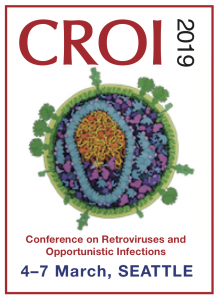First phase 1 results from bNAb PGT121 in HIV positive people
28 March 2019. Related: Conference reports, Antiretrovirals, CROI 26 (Retrovirus) 2019.
 Simon Collins, HIV i-Base
Simon Collins, HIV i-Base
Several studies at CROI provided insight into the potential for broadly neutralising monoclonal antibodies (bNAbs) for both HIV treatment and HIV prevention.
This included results of a randomised double blinded, dose escalation, placebo-controlled trial phase 1 study of PGT121 presented by Kathryn Stephenson from Beth Israel Medical Centre, Boston.
PGT121 is an IgG1 mAb that targets the V3 Env epitope.
The first part of this two-part study was in 20 HIV negative individuals and 15 HIV positive people on ART. Single doses of PGT121 were given at 3, 10, and 30 mg/kg IV infusion or 3 mg/kg subcutaneous injection. The second part gave a single open-label infusion of PGT121 at 30 mg/kg IV in HIV positive participants not on ART with either high viral load (3.3 – 4.8 log copies/mL, n=9) or low viral load (2 – 2.6 log copies/mL, n=4).
Safety and tolerability was good in both parts of the study with most participants reporting no local or systemic side effects from the single treatment. The only serious adverse event was a knee operation not related to study medication. Grade 2 events (headache and malaise) were reported in approximately 5% participants.
PGT121 had different pharmacokinetic properties in each of the three groups, with a median half life of 23.5, 19 and 13 hours in the HIV negative, ART and non-ART groups respectively.
In the HIV positive group with high viral load there were five responders and four non-responders with a median viral load reduction at day 7 of –1.7 logs in the responder group (maximum –2.1 log). Viral load then returned to baseline over the next 4-6 weeks with resistance to PGT121 in these 5/5 participants.
However, two participants in the low viral load group had rapid viral load reductions to <40 copies/mL that remained undetectable for the next 6 months. One of these participants rebounded (with PGT121 sensitive virus) at day 168 and the other has remained undetectable at this timepoint. In both these participants, detectable levels of PGT121 fell below the sensitivity of the test (0.7 ug/mL) at day 112.
Immunological assessments so far have failed to find any changes in HIV-specific cellular responses with activity explained by antiretroviral potency of PGT 121.
comment
These tentative results give an indication that bNAbs might have the potential to maintained sustained viral suppression off-ART for more than six months in context of very low viral load, albeit using an intervention that is currently too expensive for anything other than a research setting.
It is difficult to understand why bNAbs are being developed using monotherapy studies when the development of resistance in this setting is both predicted and expected.
Reference
Stephenson KE et al. Therapeutic activity of PGT121 monoclonal antibody in HIV-infected adults. Conference on Retroviruses and Opportunistic Infections (CROI), 4-7 March 2019, Seattle. Oral abstract 145.
http://www.croiconference.org/sessions/therapeutic-activity-pgt121-monoclonal-antibody-hiv-infected-adults (abstract)
http://www.croiwebcasts.org/console/player/41314 (webcast)

